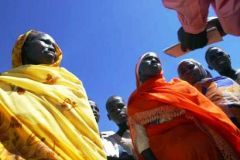UN team in Sudan to investigate genocide reports
EL FASHER, Sudan, Nov 8 (Reuters) – A U.N. team has arrived in Sudan to investigate whether genocide has occurred in the country’s Darfur region where more than 1.5 million people have been made homeless by conflict, a U.N. spokesman said on Monday.

|
|
Women talk to a United Nations official at Abushouk camp near El Fasher, the capital of North Darfur state November 7, 2004. The camp is home to more than 45,000 people who have fled fighting in the troubled Darfur region of western Sudan. (Reuters). |
The United States has accused the Sudanese government and Arab Janjaweed militias, which Washington says Khartoum backs, of genocide in the arid area where conflict broke out in 2003 after years of clashes between African farmers and Arab nomads.
Khartoum dismisses the charge of genocide and describes the Janjaweed as outlaws.
George Somerwill, a U.N. spokesman in Sudan, told Reuters the international commission of inquiry arrived late on Sunday and would travel to Darfur in the west of Sudan on Wednesday. He said they were due to return to the capital Khartoum on Nov. 20.
“It is to begin its investigation of reports of violations of international humanitarian law and human rights law in Darfur by all parties, including to determine whether or not acts of genocide have occurred and to identify the perpetrators of such violations,” he said of the team’s mandate.
Somerwill did not give details of the make-up of the team. In October U.N. Secretary-General Kofi Annan named a five-member panel led by Italian judge Antonio Cassese to investigate whether genocide has taken place in Darfur. The panel was created at the request of the U.N. Security Council.
Cassese was the first president of the International Criminal Tribunal for the former Yugoslavia, a court based in The Hague that is looking into suspected war crimes in the Balkans including during Bosnia’s 1992-1995 war.
Darfur rebels launched their revolt against the government in February 2003, accusing Khartoum of neglecting their region. They also accuse Khartoum of arming the Janjaweed to loot and burn African villages and kill the inhabitants.
Two U.N. human rights watchdogs told the U.N. Security Council in September that war crimes had probably occurred on a “large and systematic scale” in Darfur.
There are no reliable figures for how many people have died as a direct result of the fighting, but the United Nations said last month that 70,000 people have died from disease and malnutrition since March.
The United Nations has said the conflict has created the world’s worst humanitarian disaster.
